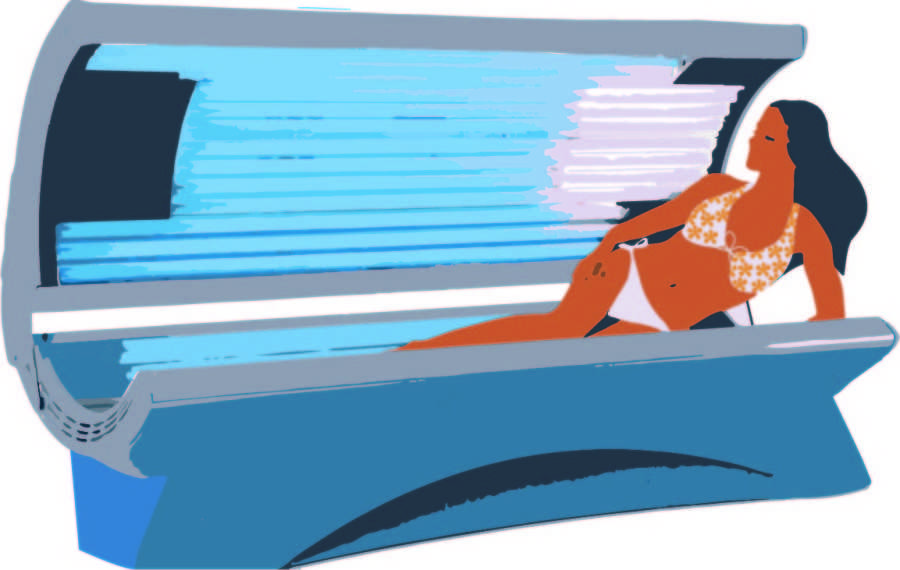Bill could prohibit minors from tanning
House Bill 2435 has the potential to disallow Kansas teenagers to use ultraviolet tanning equipment
March 12, 2014
Whether to get ready for formal, prepare for a spring break trip or get a sun-kissed glow in the doldrums of winter, teens go to tanning beds without restriction in Kansas.
However, a bill discussed this year by the Kansas Legislature would have compromised teens’ legal ability to get bronzed skin indoors. House Bill 2435 would prohibit people younger than 18 from using UV tanning equipment, thus affecting LHS students who frequent tanning salons. Businesses could face a $250 file for violating the law.
It isn’t the first time the issue has come before the Legislature, and it may not be settled this year. The bill has bounced between House committees and seems unlikely to advance this session.
In recent years, the use of UV tanning equipment by minors has skyrocketed. In a recent testimony to the House Committee on Health and Human Services, the American Academy of Dermatology Association (AADA) said 38.6 percent of teenage girls have, at some point, gone to a tanning bed.
“This bill represents a very important public health issue,” said Dr. Dirk Elson, president of the AADA. “There is no such thing as a ‘safe’ tan. UV radiation damages the skin’s DNA, which is the beginning stage of skin cancer.”
For this reason, six other states have already passed bills similar to what is proposed in Kansas. Also, the Centers for Disease Control and Prevention made it one of their objectives by the year 2020 to reduce tanning practices in adolescents.
Currently, there are limits on tanning by minors although some tanning businesses require permission of parents when minors come to tan. Such limits are self-imposed, and the American Suntanning Association actually supported the proposed change to state law while acknowledging that many tanning businesses would oppose it.
Sophomore Lexi Mason has been going to tanning beds about once a month for two years, she said it’s because she doesn’t get very tan in the summer. Her parents consent.
Local tanning facility Mango Tan has always upheld this requirement for teenagers wanting to use UV tanning devices.
“It’s always been the policy at Mango Tan that anyone under the age of 18 must have parental permission for UV tanning,” salon owner Kristi Lawrence said. “UV tanning under the age of 14 is not permitted.”
Lawrence ensures that each client has a health consultation before they begin tanning, and anyone who cannot tan outside cannot do so indoors.
While tanning beds are used to mimic the effects of being in the sun, the elevated levels of ultraviolet radiation can be more harmful, according to Elson.
It’s no secret that overexposure to sunlight or a simulated replica damages skin and can cause long-term health problems, but what is not as publicized is that it can also cause failure of other bodily functions.
“Indoor tanning equipment, which includes all artificial light sources, including beds, lamps, bulbs, booths, etc., emits UVA and UVB radiation,” Elson said. “The amount of the radiation produced during indoor tanning is similar to the sun, and in some cases might be stronger.
Indoor tanning has been classified a class 1 carcinogen, can cause basal cell carcinoma, squamous cell carcinoma, molecular damage of the skin and damage to the eyes. However, the most detrimental effect of UV tanning is the elevated chance of developing the most deadly form of skin cancer: melanoma.
Melanoma is becoming the most common cancer among 15-29 year olds. Between 2005 and 2009, its prevalence increased by 12 percent, the AADA said. The use of tanning equipment increases one’s susceptibility to developing the cancer by 40 percent.
While the correlation between tanning and increased likelihood of skin cancer has been made, early detection is difficult, as melanoma has the tendency to show up years after UV exposure.
Those testifying also questioned the credibility of the indoor tanning industry, citing that it has a history of advertising false safety claims.
An industry representative actually supposed the law while
also defending the practice of indoor tanning.
The American Suntanning Association testified before lawmakers that while it supported the bill, it said some concerns were overstated. According to Joseph Levy, the scientific advisor for the ASA, limiting access for teens could result in young people using unregulated and dangerous home-tanning equipment.
Levy noted that tanning is the body’s way of protecting itself from sunburn, and that the human body was designed to withstand large amounts of sunlight. He testified to lawmakers that the risk for melanoma is much more reliant on heredity than on UV exposure.
Coupled with the dispute over health, is the question of whether or not the Legislature has the authority to regulate teens tanning.
“This should not be the decision of our state government to decide if a teenager can tan before prom or to prepare their skin for a spring break trip,” Lawrence said. “This should be left for the parent to decide. Just like the law states for body piercing or tattoos, you must have parental permission under the age of 18.”














